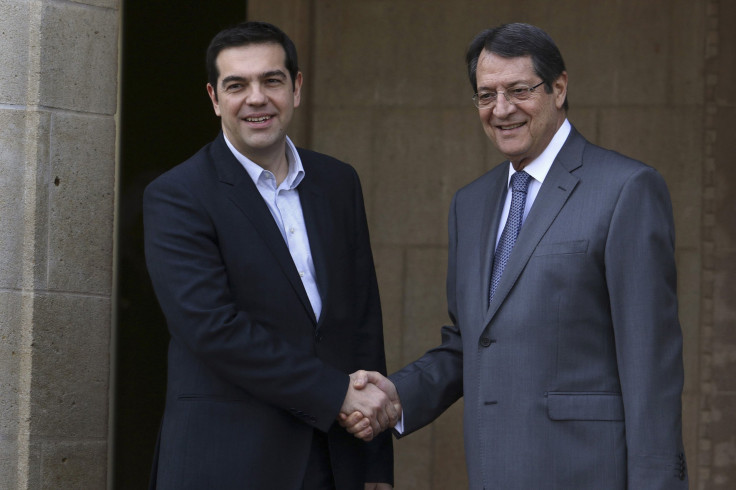Tsipras Says No To Possible Russian Aid; Says Greece Will Stay In Euro Zone During First Foreign Trip

Greek Prime Minister Alexis Tsipras ruled out the possibility of his left-wing Syriza government seeking economic aid from Russia, saying he intends to stick to his mandate of renegotiating relief terms for the embattled nation with its European partners.
On his first official foreign visit, to Cyprus, Tsipras said Greece and Cyprus needed to cooperate to form a "bridge of peace and cooperation between Europe and Russia,” Reuters reported, adding that the country's new leader ruled out seeking aid from Russia. Tsipras also reportedly denied rumors of Greece leaving the European Union, saying that even small states like Greece and Cyprus are essential to the continued integrity of Europe.
"The EU and eurozone would be both dismembered along their Southeastern flank without Greece and Cyprus," he said.
However, he reiterated that the current terms of the bailout package for Greece were untenable, calling for the “troika” mechanism -- composed of the European Commission, the European Central Bank and the International Monetary Fund -- to be dismantled.
"I believe that this would be a mature and necessary development for Europe," Tsipras said.
Tsipras also expressed support for Cyprus, which has been Greece’s long-time ally and one that has historically been supported in its territorial dispute with Turkey.
Meanwhile, German news site Deutsche Welle reported that Greek finance minister Yanis Varoufakis was in Britan, meeting his counterpart George Osborne, in an effort to shore up support for Greece’s position in challenging its bailout terms. Varoufakis has made similar moves in France, the BBC reported, and has trips planned for Rome and elsewhere in Europe.
In France, Varoufakis said that the Syriza government has “one objective in mind- the prosperity of the average European citizen,” and said Greece would not accept another portion of the bailout package, while admitting that the country needed the money.
"We have resembled drug addicts craving the next dose,” he said. “What this government is all about is ending the addiction."
The “troika” has agreed on a 240 billion euro ($270 billion) bailout package to help the economically battered country pay off its debts, which are currently worth 175 percent of its GDP, and help its economy recover. However, it has also imposed stringent austerity measures, calling for the privatization of national companies and cutting spending on social welfare, which Syriza refuses to follow.
Germany is one of Greece’s primary creditors, and Chancellor Angela Merkel has insisted that Greece needs to honor its debts and stick to the bailout conditions it agreed to in the past. In 2012, Greece’s debt was roughly halved as part of a major write-down to help the country regain solvency.
"There has already been voluntary debt forgiveness by private creditors, banks have already slashed billions from Greece's debt," Merkel reportedly said, according to Deutsche Welle, which cited German-language publication Hamburger Abendblatt, denying the possibility of further debt write-downs. However, Merkel added that she wanted Greece to remain part of the euro zone.
"Europe will continue to show its solidarity with Greece, as with other countries hard hit by the crisis, if these countries carry out reforms and cost-saving measures," she said.
© Copyright IBTimes 2024. All rights reserved.











